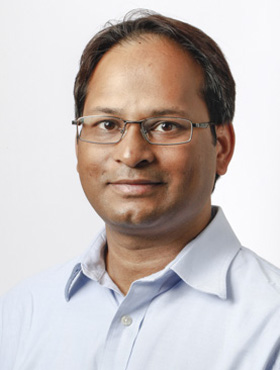Bar Harbor, Maine - Vivek Kumar, Ph.D., a neuroscientist who studies neuronal circuits that regulate addiction, attention deficit and hyperactivity disorder, depression and other behaviors, is joining The Jackson Laboratory faculty as an assistant professor.
Since 2009 Kumar has been in the department of neuroscience at the University of Texas Southwestern Medical Center in Dallas, first as a postdoctoral fellow in the laboratory of Joseph S. Takahashi, Ph.D., and since 2011 as an instructor. He holds an A.B. in biology from the University of Chicago and earned his Ph.D. at the University of California, San Diego, in the laboratory of Michael G. Rosenfeld, Ph.D.

Kumar studies reward behaviors such as addiction using mouse models, applying functional genomics, high-throughput behavioral screening, biochemistry, molecular biology and imaging techniques.
He has already established collaborative relationships with several Jackson Laboratory faculty members. Last year he coauthored a paper in Science with JAX Professor Gary Churchill, Ph.D., Takahashi and other researchers, establishing that responses to cocaine and methamphetamine differ between two substrains of C57BL/6, or “Black 6,” laboratory mice.
In that paper, Kumar and colleagues identified Cyfip2 as a gene that regulates cocaine response through control of structural plasticity in the brain.
In other work, using an approach known as forward genetics (observing physiological traits and then determining the genetic sequence responsible for them), Kumar has screened more than 30,000 mice for behavioral deficits, identifying several new mouse models.
Kumar will join the JAX faculty in late 2014, and his wife, Neha, will come to the Laboratory in January 2015 as a senior financial analyst.
The Jackson Laboratory is an independent, nonprofit biomedical research institution and National Cancer Institute-designated Cancer Center based in Bar Harbor, Maine, with a facility in Sacramento, Calif., and a new genomic medicine institute in Farmington, Conn. It employs 1,600 staff, and its mission is to discover precise genomic solutions for disease and empower the global biomedical community in the shared quest to improve human health.